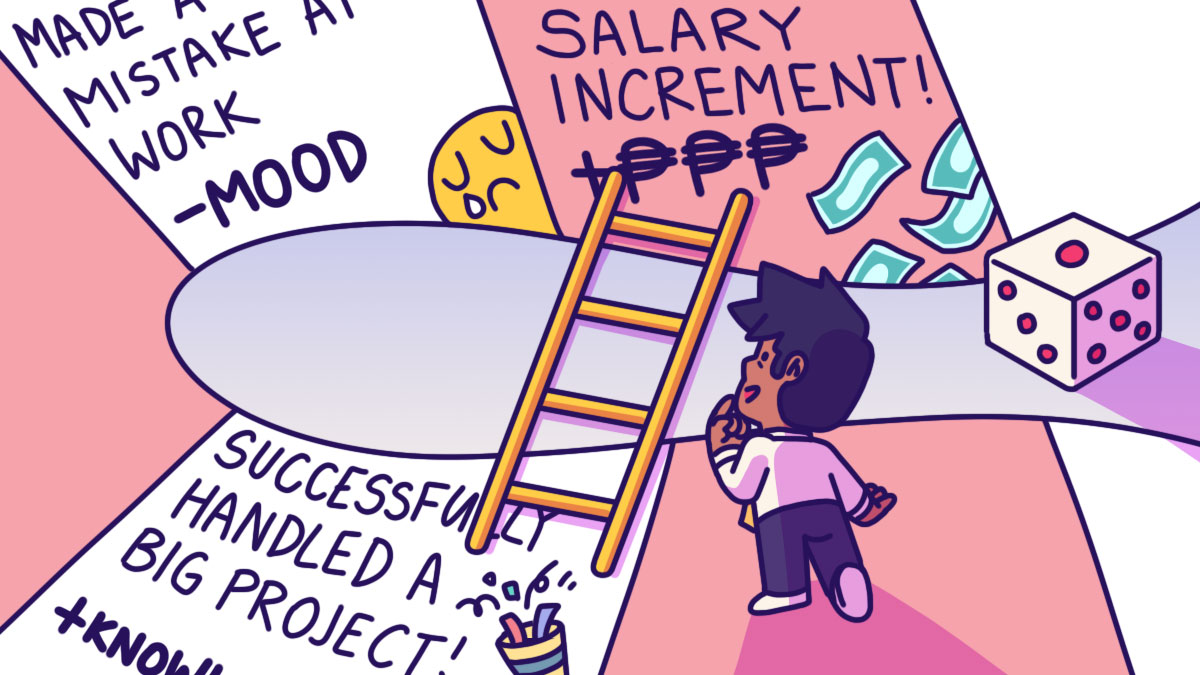Career & Education | Life | Article
An HR Director Shares 4 Tips On How You Can Get A Salary Increment
by Busra Aulya | September 13, 2024

Let’s be honest – most of us are dissatisfied with our current salaries. According to a poll conducted by The Simple Sum (TSS) involving 2,100 respondents from across Southeast Asia, nearly 60% admitted that they were not satisfied with their current salary. Additionally, 75% of TSS’s followers hope to receive a salary increase at least once a year. So, if you feel like it’s time to ask for a raise, you’re not alone.
However, asking for a salary increase can be nerve-wracking, so many people avoid having this conversation. But instead of avoiding it, it’s better to prepare yourself for it as this will enhance your chances of getting the raise you want.
As Jeremy Ong, Executive Director of People Experience Management at Golden Equator Group, points out, “Despite the assumption that companies are proactive with salary increments based on merit, the reality is, if you don’t ask, you don’t get, more so in smaller companies.”
So, if you want to successfully secure a raise, it’s crucial to approach this process with the right strategy. Jeremy shares four career tips that can increase your chances of getting a salary increase:
Related
1. Consistently demonstrate high-quality performance
The key to negotiating a salary increase is by demonstrating a solid work performance. While every company has different indicators for assessing quality performance, there are some common benchmarks, such as meeting deadlines, producing quality work, taking initiative, and being a good team player.
Jeremy emphasises that exceptional employees are those who not only meet but exceed expectations. “A high-performing achiever is someone who meets work deadlines as promised, produces a significant amount of quality work, shows commitment to their work and the business, takes initiative, puts themselves out there to volunteer and do more, is proactive in solving problems, thinks commercially, is a team player, and finally, shows empathy for their boss, and the company,” he explains.
By consistently delivering more than what is expected, you can build a strong argument for why you deserve a raise.
2. Take on major projects
In addition to handling your daily tasks, taking on major projects that have a significant impact on the company can be an effective way to stand out. These projects often push you out of your comfort zone and provide opportunities to demonstrate leadership skills, innovation, and problem-solving abilities.
Jeremy says, “The key is to avoid focusing on meticulously listing a laundry list of every single tasks which you have completed, but rather you should be highlighting the value you have brought to the Company. Are you a revenue generator, or revenue enabler? How have your contributions made your manager’s life easier? How has your team benefitted from having you in the mix?”
If you can prove that your contributions directly impact the company’s profitability or improve operational efficiency, it will be easier to make a strong case for a salary increase. Employees who can create or support revenue are typically valued more because their contributions are clearly tied to the company’s success. So, don’t hesitate to seize these opportunities and showcase the added value you bring.
3. Understand the company’s financial condition
Timing your request for a salary increase is crucial. Understanding the company’s financial condition can help you determine the right moment.
Jeremy advises, “It is important to be able to ‘read the room’. When you ask for a pay raise, timing is key, and you want to take action at the most opportune time. Asking for a raise when the financial health of a business is not at its best can be seen as having lack of empathy or poor EQ to management.”
Additionally, you need to be aware of your own value but remain realistic. Remember that your salary should increase with your experience, knowledge, and skills. A higher salary also means higher expectations from the company. If your salary exceeds the value you bring, you might be at risk during the next retrenchment exercise.
However, if you believe you deserve a raise even in tough times, make sure to present concrete evidence of the positive impact of your contributions. If a direct raise isn’t possible, you can negotiate alternatives such as a delayed raise, back pay at a later date, or other compensation options like Employee Stock Ownership Programs.
4. Negotiate During Performance Reviews
Performance reviews are a good time to discuss a salary increase. Before entering the discussion, ensure you are well-prepared. Conduct market research to understand where your salary stands compared to industry standards.
Also, document your achievements in detail and focus on the positive impact you’ve made on the company, rather than just listing completed tasks.
Building consistent communication with your supervisor throughout the year – not just during performance reviews – can also strengthen your position when requesting a raise.Start building momentum from the beginning of the year by continuously communicating and providing regular updates to your manager about your contributions. This will make it easier for your manager to recognise and appreciate the value you bring.
“You should update your manager on your progress throughout the year. The performance review should be a summary of the conversations which have taken place in the past year,” explains Jeremy.
Additionally, don’t underestimate yourself during negotiations. Lacking confidence or fearing potential repercussions is a major mistake. If you believe in the value you bring and feel you’re not being paid according to market standards, fight for your rights.
















